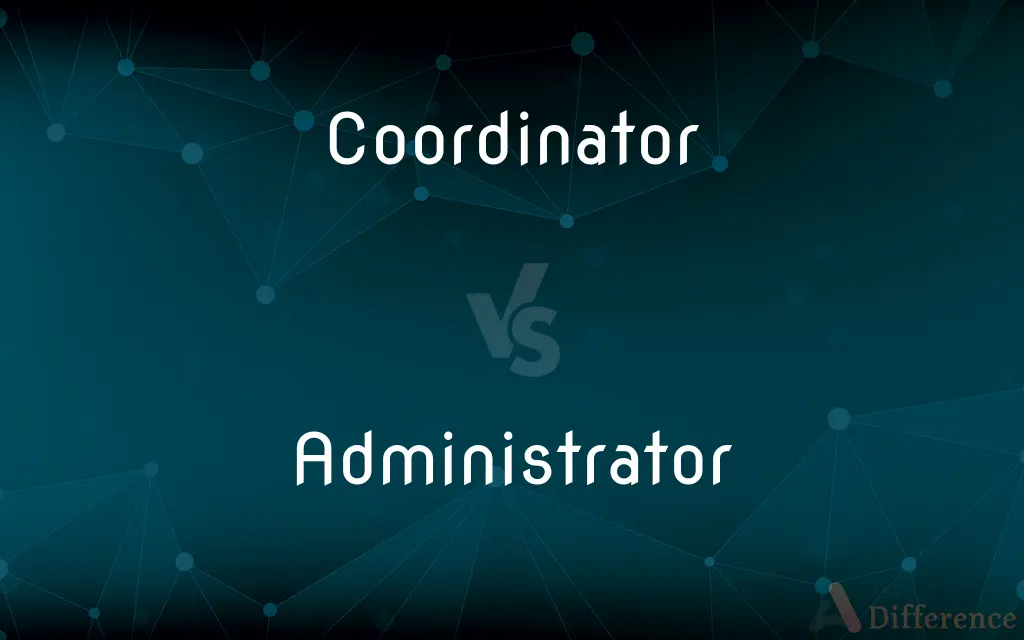Coordinator vs. Administrator — What's the Difference?
By Tayyaba Rehman — Updated on September 26, 2023
A coordinator organizes and ensures tasks are executed smoothly, focusing more on teamwork and logistics, while an administrator oversees and manages the overall operations, policies, and goals of an organization or system.

Difference Between Coordinator and Administrator
Table of Contents
ADVERTISEMENT
Key Differences
A coordinator and an administrator are key organizational roles, each with its own set of responsibilities and focus areas. A coordinator is primarily responsible for organizing, scheduling, and ensuring that specific tasks or projects are executed smoothly and efficiently. The coordinator works to align multiple elements of a project or task, facilitating communication and collaboration among team members, ensuring all components are synchronized. An administrator, however, holds a more comprehensive and authoritative role, managing the overall operations, policies, and objectives of an organization or a specific department, and usually has a more overarching view of the organization’s functioning.
The role of a coordinator often emphasizes teamwork and logistical management. A coordinator acts as a link between different team members, departments, or organizations, managing details and logistics to realize collective goals. They focus on executing plans effectively, ensuring resources and efforts are optimized, and objectives are met on time. An administrator, in contrast, is more focused on organizational management and leadership. They make crucial decisions, implement policies, and are often responsible for financial management, human resources, and strategic planning, aiming to ensure the organization’s sustainability and growth.
In terms of authority and scope of work, a coordinator usually operates within a more confined framework, concentrating on the logistical aspects of specific tasks or projects, whereas an administrator has a broader scope, overseeing the structure, strategy, and overall wellbeing of an organization or department. Coordinators typically work to align the efforts of individuals and groups to achieve cohesive results, whereas administrators are concerned with shaping the environment in which these individuals and groups operate, establishing policies, and setting goals.
When comparing the skill set required for these roles, a coordinator needs strong organizational, communication, and interpersonal skills to manage logistics and foster collaboration among team members. They must be detail-oriented, ensuring all aspects of a task or project are addressed efficiently. An administrator, however, needs a broader skill set including leadership, decision-making, strategic planning, and often, financial management skills, to guide the organization effectively through various challenges and opportunities.
In essence, while both coordinator and administrator play crucial roles in organizational management, they differ significantly in focus, responsibilities, authority, and required skills. A coordinator is centered around organizing and synchronizing tasks and projects, while an administrator is involved in higher-level decision-making and management of the organization’s overall objectives and policies.
ADVERTISEMENT
Comparison Chart
Focus
Organizing and ensuring smooth execution of tasks or projects
Managing overall operations, policies, and goals of an organization
Authority
Operates within a confined framework, mainly focusing on logistics
Holds broader and higher authority, involved in decision-making
Skill Set
Strong organizational, communication, and interpersonal skills
Leadership, strategic planning, and often, financial management skills
Responsibilities
Aligning efforts of individuals and groups, managing details and logistics
Establishing policies, setting goals, and overseeing structure and strategy
Scope
Concentrates on specific tasks or projects
Oversees the overall wellbeing and functioning of an organization
Compare with Definitions
Coordinator
A person who organizes and synchronizes different components of a project.
The event coordinator ensured all activities ran on schedule.
Administrator
An individual who oversees and manages organizational policies, goals, and strategies.
The network administrator ensured the security and functionality of the IT infrastructure.
Coordinator
A role focused on logistical management and execution of tasks.
The coordinator meticulously managed the logistics, ensuring timely completion of the project.
Administrator
A person responsible for the overall management and operation of an organization or system.
The school administrator implemented new policies to improve student learning.
Coordinator
Someone responsible for aligning multiple elements to realize collective goals.
The marketing coordinator worked to integrate various strategies for a cohesive campaign.
Administrator
A person with broad responsibilities including strategic planning and organizational wellbeing.
The business administrator developed a strategic plan to guide the company’s growth.
Coordinator
A detail-oriented individual who manages specifics to achieve efficient results.
The travel coordinator arranged all the accommodations and transportations without a hitch.
Administrator
A role involving leadership, decision-making, and often, financial management.
The system administrator resolved complex issues to maintain operational continuity.
Coordinator
A person whose job is to organize events or activities and to negotiate with others in order to ensure they work together effectively
A full-time coordinator was appointed to oversee the referral process
Administrator
Someone who shapes the organizational environment, establishing policies and setting goals.
The database administrator optimized the system for better performance and reliability.
Coordinator
A word used to connect clauses, sentences, or words of equal syntactic importance (e.g. and, or, for)
Subordinate clauses can be connected with a coordinator
Administrator
A person responsible for carrying out the administration of a business or organization
Hospital administrators
Coordinator
(Mathematics)Any of a set of two or more numbers used to determine the position of a point, line, curve, or plane in a space of a given dimension with respect to a system of lines or other fixed references.
Administrator
A person who dispenses or administers something
Administrators of justice
Coordinator
Coordinates Informal Directions
Give me some coordinates so I can find my way.
Administrator
One who administers, especially one who works as a manager in a business, government agency, or school.
Coordinator
Coordinates A set of articles, as of clothing or luggage, designed to match or complement one other, as in style or color.
Administrator
(Law) One appointed to administer an estate.
Coordinator
Of equal importance, rank, or degree
Jobs with coordinate responsibilities.
Administrator
One who administers affairs; one who directs, manages, executes, or dispenses, whether in civil, judicial, political, or ecclesiastical affairs; a manager
Coordinator
(Grammar)Having equal syntactic status; not subordinate
Coordinate phrases.
Administrator
(legal) A person who manages or settles the estate of an intestate, or of a testator when there is no competent executor; one to whom the right of administration has been committed by competent authority
Coordinator
(Mathematics)Of or based on a system of coordinates.
Administrator
(computing) One who is responsible for software installation, management, information and maintenance of a computer or network
Coordinator
Of or relating to a university in which men and women are taught by the same faculty but in single-sex classes or on single-sex campuses.
Administrator
One who administers affairs; one who directs, manages, executes, or dispenses, whether in civil, judicial, political, or ecclesiastical affairs; a manager.
Coordinator
To cause to work or function in a common action or effort
Coordinating the moving parts of a machine.
Administrator
A man who manages or settles the estate of an intestate, or of a testator when there is no competent executor; one to whom the right of administration has been committed by competent authority.
Coordinator
To make harmonious; harmonize
Coordinate the colors of a design.
Administrator
Someone who administers a business
Coordinator
(Grammar)To link (syntactic units) at an equal level.
Administrator
The party appointed by a probate court to distribute the estate of someone who dies without a will or without naming an executor
Coordinator
To work or function together harmoniously
A nursing staff that coordinates smoothly.
Administrator
Someone who manages a government agency or department
Coordinator
To form a harmonious combination; match
Shoes that coordinate with the rest of the outfit.
Coordinator
One who coordinates.
Coordinator
An assistant coach responsible for a particular facet of the game, such as defense.
Coordinator
(grammar) A member of a lexical class of words that joins two or more items (such as words, phrases, or clauses) of equal syntactic importance.
Coordinator
Someone whose task is to see that work goes harmoniously
Coordinator
An individual who facilitates communication and collaboration among team members.
The project coordinator arranged regular meetings to discuss progress and resolve issues.
Common Curiosities
Is a coordinator mainly focused on organizing and executing specific tasks or projects?
Yes, a coordinator primarily focuses on organizing and ensuring the smooth execution of specific tasks or projects.
Is an administrator involved in higher-level decision-making and strategic planning?
Yes, an administrator is involved in higher-level decision-making, strategic planning, and often financial management.
Does an administrator manage the overall operations and policies of an organization?
Yes, an administrator is responsible for managing the overall operations, policies, and goals of an organization.
Does a coordinator need strong organizational and communication skills?
Yes, a coordinator requires strong organizational, communication, and interpersonal skills to manage logistics and foster collaboration.
Does a coordinator typically have less authority than an administrator?
Yes, a coordinator generally operates within a more confined framework with less authority compared to an administrator.
Is leadership a crucial skill for an administrator?
Yes, leadership is a crucial skill for an administrator, along with decision-making and strategic planning.
Does a coordinator focus more on the logistical aspects of tasks or projects?
Yes, a coordinator mainly focuses on the logistical aspects, managing details to ensure the smooth execution of tasks or projects.
Does an administrator oversee the overall wellbeing and functioning of an organization?
Yes, an administrator oversees the overall wellbeing and functioning of an organization, ensuring its sustainability and growth.
Can a coordinator facilitate collaboration among team members?
Yes, a coordinator facilitates communication and collaboration among team members, aligning their efforts to achieve collective goals.
Is a coordinator detail-oriented, managing specific aspects of a task or project?
Yes, a coordinator is detail-oriented, managing specific aspects and logistics of a task or project to achieve efficient results.
Is an administrator responsible for establishing organizational policies and goals?
Yes, an administrator is responsible for establishing policies, setting goals, and managing the overall structure and strategy of an organization.
Share Your Discovery

Previous Comparison
Davenport vs. Couch
Next Comparison
Ethics vs. EthicalAuthor Spotlight
Written by
Tayyaba RehmanTayyaba Rehman is a distinguished writer, currently serving as a primary contributor to askdifference.com. As a researcher in semantics and etymology, Tayyaba's passion for the complexity of languages and their distinctions has found a perfect home on the platform. Tayyaba delves into the intricacies of language, distinguishing between commonly confused words and phrases, thereby providing clarity for readers worldwide.















































